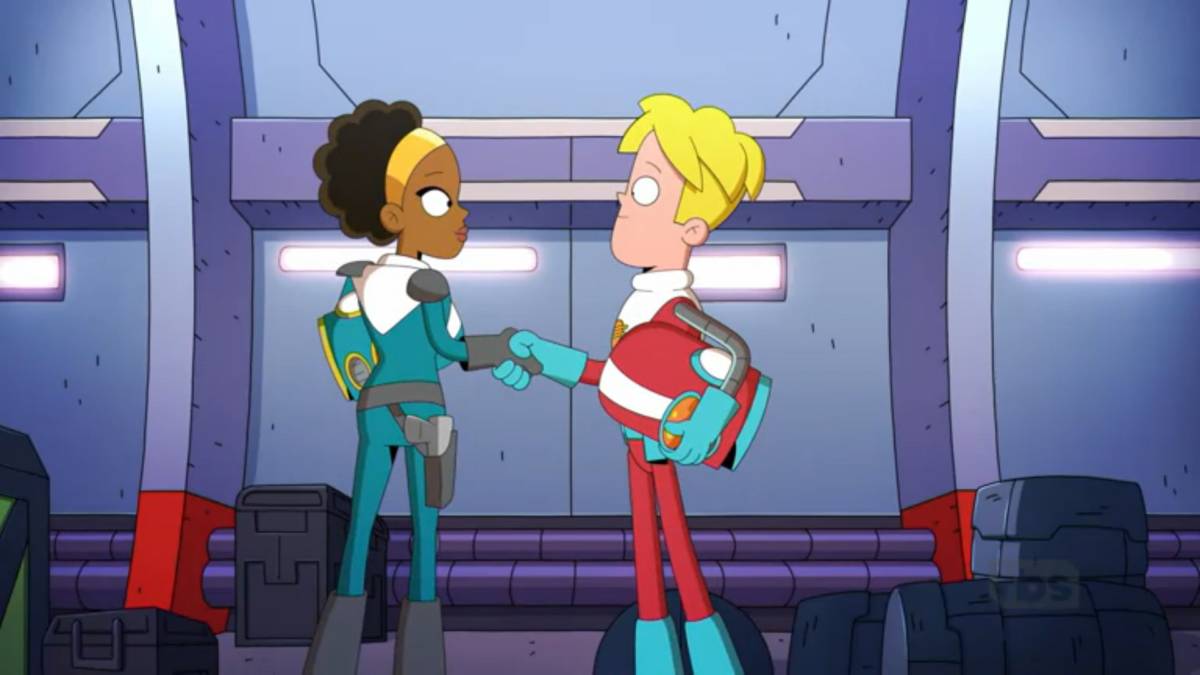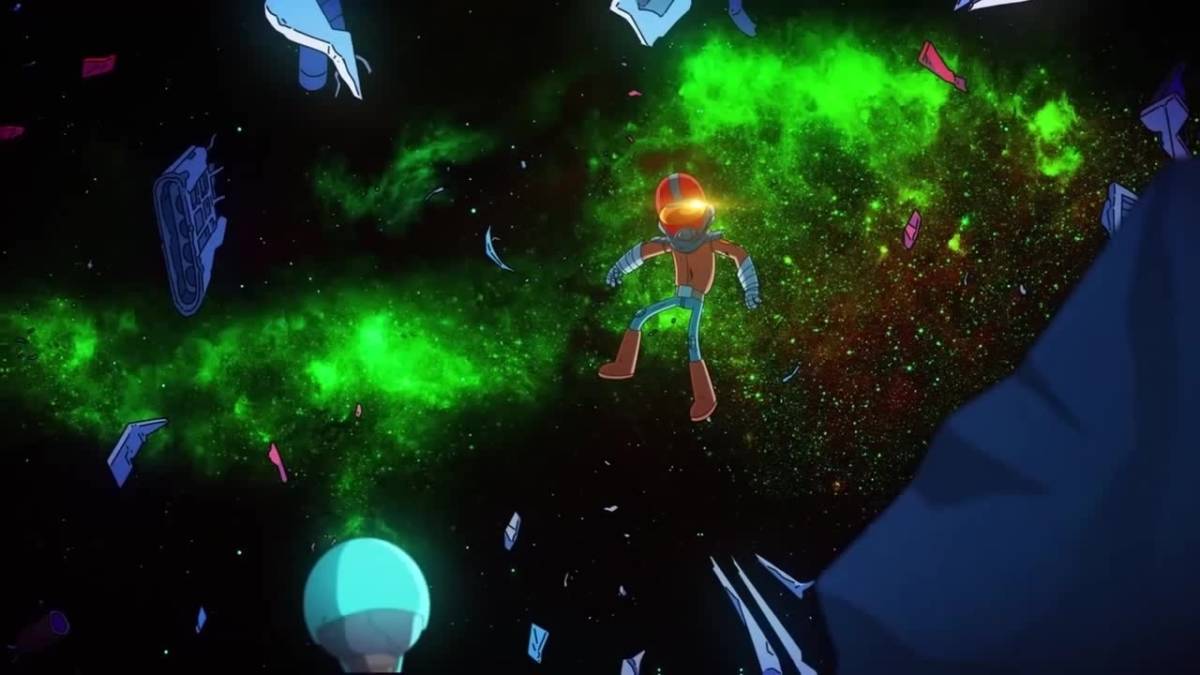Any current animated show with a sci-fi theme – hell, quite possibly any animated show period – must live and die in the shadow of the mighty Rick and Morty. Yes, we’ve heard the memes about how you have to have a high IQ to enjoy it, but that only speaks to its strengths. With nothing more than technobabble and pop-nihilism, it’s managed to make the average cartoon viewer feel like Magnus Magnussen.
Netflix’s Final Space very obviously bears the scars of Rick and Morty’s influence – and, likewise, those of its direct ancestor Futurama – taking as its starting point basically the same grab-bag of sci-fi tropes that R&M and Futurama have crystallised into a now-familiar formula. Having your own crack at a tried-and-tested setup is by no means a bad thing. However, that means being judged on how well you do it, and that carries with it being compared to the classics of the genre. On its own, James Nguyen’s Birdemic: Shock And Terror might have been forgotten about – but thanks to the existence of Hitchcock’s The Birds, Birdemic went down in history as famously awful.
This isn’t to say Final Space is a retread. It ventures further into full-on sci-fi than its predecessors, which always balanced that with a more domestic (quite literally earth-bound) side. However, it’s still an animated sci-fi comedy, although oftentimes that last category seems to fade away a bit, and the narrative retreats to the safer territory of straight action-drama. It is possible to work witty dialogue into and around gunfights, but typically the show doesn’t even try.

Final Space is let down most by its protagonist, Gary (voiced by creator Olan Rogers), who takes Rick’s irreverence and Morty’s everyman qualities and garbles them together to create something far, far less than the sum of its parts. Where Rick genuinely didn’t give a shit, Gary just seems flighty and disinterested – and, worse yet, given the slightest provocation his voice picks up that screechy quality that is too often used as a poor substitute for genuine passion.
Gary’s boyish lust for cookies could have been endearing, but is used with too heavy a hand, rendering him a bit too much of a man-child for centre stage. While this side of him does taper off slightly as time, he doesn’t come close to actually growing out of it – and this lack of growth permeates his entire character. Even the resolution of his daddy issues (which, when it comes, feels like an offensive stereotype of what every millennial male secretly wants from their boomer/gen-X sire) doesn’t prompt any kind of real development.
The rest of the gang are familiar old archetypes – gruff bloke with a heart of gold, hypercompetent woman, sassy robot, cute nonverbal thing with mysterious powers – who don’t have anything actively wrong with them, but who have all seen better incarnations elsewhere, often in the same room. What’s fairly damning is that it takes the show a good four episodes to fully assemble this ensemble, the tell-tale sign of the writers knowing Netflix had already chucked them a whole season and so they didn’t have to get things going at full speed immediately.

Gary and Quinn (the hypercompetent woman) have a burgeoning romantic subplot which is, for the most part, harmlessly reminiscent of Futurama’s Fry and Leela. But that’s only if you’re willing to overlook the huge chink in the armour, which is that they met once, briefly, then Gary spent the next five years obsessed with her. This is treated as sweet rather than evidence of him having gone stir-crazy. The dividing line between behaviour like this being romantic or being appallingly creepy seems to be whether it’s being done by the protagonist or not – and even then, it only works because, in the words of John Finnemore, the same person is writing what he does and what she thinks about it.
The art style is adventurous enough, conveying space as a yawning expanse with all the existential terror it deserves, and drawing space-horrors with real panache, especially towards the end of the season. The only weakness is, again, the main character roster, with the character models occasionally rising above ‘bland’. The best of the bunch is probably the main antagonist (voiced by David Tennant at a steady ham factor five), a kind of psychic space testicle who gradually falls apart – that is to say, becomes more visually interesting – over the course of the series.
After all the above, I’m inclined to lenience on the plot. This is, after all, the genre of reversing the polarity of the neutron flow, and of coming up with a complicated plan then explaining it using a simple analogy. Granted, it quickly triangulates all the different factions in play into simple good-vs-evil superblocs, but criticising anything for that knocks out a good chunk of the Western canon. What’s shakier is how everyone still goes on about the need to save Earth, even after we’ve already seen it…well, not totally destroyed, but messed up pretty bad (in what is, I have to say, a marvelously animated sequence).

The show deserves some credit for not having everything end on an unambiguously positive note – although the whopping cliffhanger it leaves off on is shameless angling for a second season if ever I’ve seen it. But then, to reach for the obvious sci-fi comparison, The Empire Strikes Back is one of the most famous downer endings in history, and if Fox hadn’t granted that a sequel, the fandom might have actually gone militant, so again it’s hard to criticise Final Space too harshly for this.
But if I’m reaching for reasons not to be too critical, it’s because I’ve already gone all-in. I wanted to like Final Space, I did. And I do stand by my statement that it isn’t a retread of R&M and Futurama, but that’s only because there are closer comparisons to be made. Everything Final Space does that hadn’t already been done by Invader Zim, had been neatly covered by Red Dwarf – two sci-fi cult classics which don’t lose sight of the comedy, and which you’d almost certainly find to be a better way of spending your time.
Some of the coverage you find on Cultured Vultures contains affiliate links, which provide us with small commissions based on purchases made from visiting our site. We cover gaming news, movie reviews, wrestling and much more.



